Royal Netherlands Navy
| Royal Netherlands Navy | |
|---|---|
| Koninklijke Marine | |
 Emblem of the Royal Netherlands Navy | |
| Founded | 8 January 1488 |
| Country | |
| Type | Navy |
| Size | 7,398 active military personnel (2023)[1]
1,359 reserves (2022)[2]
19 helicopters: NH90 NFH |
| Part of | Netherlands Armed Forces |
| Headquarters | Den Helder |
| Motto(s) | Veiligheid op en vanuit zee Security on and from the sea. |
| March | Defileermars der Koninklijke Marine (Royal Netherlands Navy Service Marchpast) |
| Engagements | Eighty Years' War Dutch–Portuguese War Anglo-Dutch Wars War of the Spanish Succession War of the Quadruple Alliance French Revolutionary Wars World War II Indonesian National Revolution Korean War Battle of Arafura Sea |
| Commanders | |
| Commander | Vice-Admiral René Tas |
| Deputy commander | Rear admiral Huub Hulsker |
| Notable commanders | Michiel de Ruyter, Piet Hein, Maarten Tromp |
| Insignia | |
| Flag |  |
| Naval ensign |  |
| Naval jack |  |
| Pennant | |
| Logo | |
| Aircraft flown | |
| Patrol | NH90 NFH |
The Royal Netherlands Navy (Dutch: Koninklijke Marine, pronounced [ˈkoːnɪŋkləkə maːˈrinə]) is the maritime service branch of the Netherlands Armed Forces.[3][4] It was founded on 8 January 1488,[5] making it the third-oldest naval force in the world.
During the 17th century, the navy of the Dutch Republic (1581–1795) was one of the most powerful naval forces in the world and played an active role in the Anglo-Dutch Wars, the Franco-Dutch War, and wars against Spain and several other European powers. The Batavian Navy of the later Batavian Republic (1795–1806) and Kingdom of Holland (1806–1810) played an active role in the Napoleonic Wars, though mostly dominated by French interests.
After the establishment of the modern Kingdom of the Netherlands, it served an important role in protecting Dutch colonial rule, especially in Southeast Asia, and would play a minor role in World War II, especially against the Imperial Japanese Navy. Since World War II, the Royal Netherlands Navy has taken part in expeditionary peacekeeping operations. It often participates in European Union and NATO operations.
Ship prefixes
[edit]An international prefix for ships of the Royal Netherlands Navy is HNLMS (His/Her Netherlands Majesty's Ship).[6][better source needed] The Netherlands navy itself uses the prefixes Zr.Ms. (Dutch: Zijner Majesteits, lit. 'His Majesty's') when a King is on the throne, and Hr.Ms. (Dutch: Harer Majesteits, lit. 'Her Majesty's') when there is a Queen. This happens automatically at end of the monarch's reign.[7]
History
[edit]The modern Netherlands Navy dates its founding to a "statute of admiralty" issued by Maximilian, King of the Romans (future Holy Roman Emperor Maximilian I), and his son Philip the Fair, the ruler of Burgundian lands (a minor at that time) on 8 January 1488.[8][a]
Netherlands Golden Age
[edit]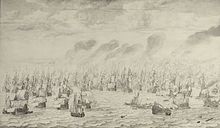
The Netherlands navy was involved in several wars against other European powers from the late 16th century, initially for independence against Spain in European waters, later for shipping lanes, trade and colonies in many parts of the world, notably during the Anglo-Dutch Wars. During the 17th century the Dutch States Navy was one of the most powerful navies in the world. As an organization, the Dutch navy consisted of five separate admiralties (three of them in Holland, and one each in Friesland and Zeeland), each with its own ships, personnel, shipyards, command structures and revenues.[9]
World War II
[edit]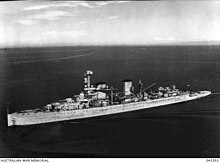

At the start of WW2 the Dutch had five cruisers, eight destroyers, 24 submarines, and smaller vessels, along with 50 aircraft. The Netherlands was conquered in 1940 by Nazi Germany in a matter of days, and two Dutch light cruisers and one destroyer leader and three destroyers that were under construction were captured in their shipyard.
For the rest of the war, the Dutch navy was based in Allied countries: the Dutch navy had its headquarters in London, and smaller units in Ceylon (modern day Sri Lanka) and Western Australia. Around the world Dutch naval units were responsible for transporting troops, for example during Operation Dynamo at Dunkirk and on D-Day, they escorted convoys and attacked enemy targets. Dutch submarines scored some victories, including one on a Kriegsmarine U-boat U-95 in the Mediterranean Sea, which was sunk by O 21, but during the war the Dutch Navy suffered heavy losses, particularly in the Pacific Theatre.
A small force of submarines based in Western Australia sank more Japanese ships in the first weeks after Japan joined the war than the entire British and American navies together during the same period, an exploit which earned Admiral Helfrich the nickname "Ship-a-day Helfrich".[10] The aggressive pace of operations against the Japanese was a contributing factor to both the heavy losses sustained and the greater number of successes scored as compared to the British and Americans in the region.
But during the relentless Japanese offensive of February through April 1942 in the Dutch East Indies, the Dutch navy in Asia was virtually annihilated, particularly in the Battle of the Java Sea (27 February 1942) in which the commander, Karel Doorman, went down with his fleet along with 1,000 sailors. The Navy sustained losses of a total of 20 ships (including two of its three light cruisers) and 2,500 sailors killed in the course of the campaign.[11] The Dutch navy had suffered from years of underfunding and came ill-prepared to face an enemy with more and heavier ships with better weapons, including the Long Lance-torpedo, with which the cruiser Haguro sank the light cruiser HNLMS De Ruyter.[12]
Netherlands New Guinea
[edit]After the war, the relations between the Netherlands and its colonies changed dramatically. The establishment of the Republic of Indonesia, two days after the Japanese surrender, thwarted the Dutch plans for restoring colonial authority. After four years of conflict the Netherlands acknowledged the independence of Indonesia.
Part of the Dutch Navy was next stationed in Netherlands New Guinea until that, too, was turned over to the Indonesian government in 1962. This followed a campaign of infiltrations by the Indonesian National Armed Forces, supported by modern equipment from the Soviet Union, that was nevertheless successfully repulsed by the Dutch navy. These infiltrations took place after the order of President Sukarno to integrate the territory as an Indonesian province.
European Union cooperation
[edit]The Navy has participated in joint European Union naval operations and exercises. Ten separate Dutch vessels have contributed to the EU Naval Force Operation Atalanta, combating Somali piracy forces in the Gulf of Aden, Arabian Sea, and Indian Ocean since 2009. The last vessel was sent in 2018; since then the Navy has only contributed staff and advisors to the mission.[13][14]
NATO cooperation
[edit]
With the creation of the North Atlantic Treaty Organization, the military focus was on the army and air force; it was not until the Korean War (1950–53) that the navy got more recognition. The government allowed the creation of a balanced fleet consisting of two naval squadrons. Apart from the aircraft carrier HNLMS Karel Doorman the Dutch navy consisted of two light cruisers (two De Zeven Provinciën class), 12 destroyers (four Holland class, eight Friesland class), eight submarines, six frigates (van Speijk-class frigates), and a considerable number of minesweepers.
As a member of NATO, the Netherlands developed its security policy in close cooperation with other members. The establishment of the Warsaw pact in 1955 intensified the arms race between West and East. Technical innovations rapidly emerged, the introduction of radar and sonar were followed by nuclear weapon systems and long-range missiles. The geopolitical situation allowed for a fixed military strategy. Beginning in 1965, the Dutch Navy joined certain permanent NATO squadrons like the Standing Naval Force Atlantic.
Structure
[edit]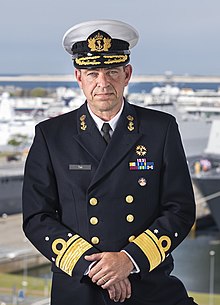
The constituent parts of the Royal Netherlands Navy are:
Naval squadron
[edit]Contains all surface combatants, replenishment ships, and amphibious support ships.
Submarine service
[edit]Houses the submarines and a support vessel.
Mine Detection and Clearing Service
[edit]Contains various minehunters.
Hydrographic Service
[edit]The Hydrographic Service is responsible for relevant hydrographic surveys.[15]
Social Medical Service
[edit]Provides healthcare to personnel of the Royal Netherlands Navy.[16][17]
Naval aviation
[edit]Two squadrons equipped with NH90 NFH helicopter based at De Kooy Airfield.
Netherlands Marine Corps
[edit]- Two Marine Combat Groups (1 MCG and 2 MCG)
- One Maritime Special Operations Force (NLMARSOF)
- One Surface Assault and Training Group (SATG)
- One Seabased Support Group (SSG)
- 32 Raiding Squadron (permanently stationed at Aruba)
- Rotterdam Marine Band of the Royal Netherlands Navy
Dutch Caribbean Naval Command
[edit]Command of the Royal Netherlands Navy that is responsible for national defense and international law enforcement in the Dutch Caribbean.[18][19][20]
Netherlands & Dutch Caribbean Coastguard
[edit]Although the Netherlands Coastguard is not an official part of the Navy, it is under its operational control. Also the Dutch Caribbean Coast Guard is under the operational control of the Navy and is commanded by the commander of the Navy in the Caribbean.
| Aircraft | Origin | Type | Coastguard base | In service | Notes |
|---|---|---|---|---|---|
| Bombardier Dash 8 MPA | Canada | SAR / Patrol | Schiphol - The Netherlands | 2[21] | |
| Bombardier Dash 8 MPA | Canada | SAR / Patrol | HATO - Curaçao Dutch Caribbean | 2 | |
| AgustaWestland AW169 | Italy | SAR / Transport | HATO - Curaçao Dutch Caribbean | 2 | |
| AgustaWestland AW189 | Italy | SAR | Den Helder & Midden Zeeland - The Netherlands | 3[22] | Operated by Bristow Group. |
Bases
[edit]The main naval base, Nieuwe Haven Naval Base is situated in Den Helder, North Holland. Secondary bases are situated around Den Helder, as well as in Amsterdam, and Willemstad on the Caribbean island of (Curaçao), Usage rights are also in place for port facilities in Rotterdam, Vlissingen and Eemshaven. The Netherlands Marine Corps has barracks in Rotterdam, Doorn, Texel and Den Helder, as well as in the Caribbean at Suffisant on Curaçao, and Savaneta on Aruba.[23][24]
Officer training
[edit]Officers of the Nederland Navy are trained at the Royal Naval Institute (Koninklijk Instituut voor de Marine), which is part of the Netherlands defence academy (Nederlandse Defensie Academie) in Den Helder.[25] Around 100-120 people start training every year.
Ships of the Royal Netherlands Navy
[edit]Ships
[edit]The Royal Netherlands Navy currently operates 7 main classes of vessels: Note: in the Royal Netherlands Navy frigates are interchangeable with destroyers as there is no separate class
| Type ship | Defence White Paper 1974 | Defence White Paper 1984 | Priority Document 1993 | Navy study 2005 | Economize 2011 | Defence White Paper 2018 |
|---|---|---|---|---|---|---|
| LC frigates | 4 | 4 | 4 | |||
| M frigates | 4 | 8 | 8 | 2 | 2 | 2 |
| GW frigates | 2 | 2 | 2 | |||
| L frigates | 1 | 2 | 2 | |||
| S frigates | 12 | 10 | 6 | |||
| MLM frigates | 6 | |||||
| Frigates | 25 | 22 | 18 | 6 | 6 | 6 |
| Patrol ships | 4 | 4 | 4 | |||
| Submarine | 6 | 6 | 4 | 4 | 4 | 4 |
| Supply ships | 2 | 2 | 2 | 1 | 1 | |
| LPD | 1 | 2 | 2 | 2 | ||
| JSS | 1 | 1 | 1 | |||
| Minehunters | 15 | 15 | 15 | 10 | 6 | 6 |
| Minesweepers | 11 | 11 | ||||
| Total ships | 59 | 56 | 40 | 28 | 23 | 24 |
| LRMP aircraft | 21 | 13 | 13 | |||
| Helicopters | 36 | 30 | 20 | 20 | 20 | 20 |
| Total aircraft | 57 | 43 | 33 | 20 | 20 | 20 |
The Royal Netherlands Navy classifies the De Zeven Provinciën-class as frigates, but internationally they are most comparable to destroyers (due to their size and weapon capability) platform for Sea Based Anti-Ballistic Missile defence
Inventory
[edit]In 2024 the fleet of the Royal Netherlands Navy consists of these ships:
| Class | Photo | Type | Number | Dates | Details |
|---|---|---|---|---|---|
| Walrus class |  |
Submarine | 3 | 1994 | Multi-purpose diesel-electric powered hunter-killer submarines for deep ocean, brown water & special forces operations. SLEP 2015-2019, two being phased out early (Walrus decommissioned in 2023); entire class to be replaced by 4 new subs starting in 2034.[26][27][28][29] |
| De Zeven Provinciën class |  |
Frigate | 4 | 2002 | Mainly anti-air warfare with BMD capability with extensive command & communication facilities, being upgraded. |
| Karel Doorman class |  |
Frigate | 2 | 1994 | 8 initially built for the Royal Netherlands Navy, pairs of ships subsequently sold to the Belgian, Portuguese and Chilean navies. Belgian and Dutch M-Class frigates recently received extensive upgrades such as an extended helicopter deck and new advanced sensors and improvements in stealthiness. Will be replaced in Dutch- & Belgian Navy in 2028-2030. |
| Holland class | 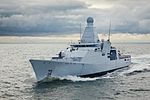 |
Offshore patrol vessel | 4 | 2011 | Ocean patrols. |
| Alkmaar class | 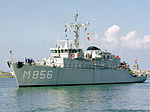 |
Minehunter | 5 | 1989 | Originally a class of 15 ships, will be replaced starting 2025[30] 2 will be donated to the Ukrainian Navy in 2024 and 2025. |
| Karel Doorman class | 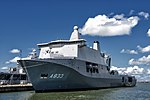 |
Joint logistic support ship | 1 | 2014 | Combined amphibious operations/seabased helicopter platform & fleet replenishing, capable of supporting AH-64E / CH-47F / NH90 NFH operations. |
| Rotterdam & Johan de Witt class |  |
Landing platform dock | 2 | 1998 / 2007 | Troop & equipment transport, helicopter platform with command & communication & hospital facilities. |
| Mk.II (NL) class |  |
Landing Craft Utility | 5 | 2005 | |
| Mk.V C (NL) class |  |
Landing craft vehicle personnel | 12 | 2008 | |
| Hydrograaf |  |
Expeditionary survey boat | 1 | 2021 | |
| Pelikaan class | 
|
Multi-purpose logistic support vessel | 1 | 2006 | Multi-purpose logistic & amphibious support vessel based in Dutch Caribbean, will be replaced in 2030. |
| Snellius class |  |
Hydrographic survey vessel | 2 | 2004 | Multi-purpose hydrographic survey vessel, will be replaced in 2030. |
| Mercuur class | 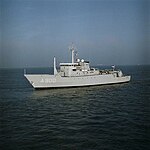
|
Submarine support vessel | 1 | 1987 | Submarine support vessel & MCM command, upgraded in 2017 and will be replaced in 2028. |
| Cerberus class | 
|
Diving support vessel | 4 | 1992 | Multi-purpose diving support vessels & harbour protection, will be replaced by 2026. |
| Soemba class | 
|
Diving support vessel | 1 | 1989 | Diving training- & support vessel, will be replaced 2026. |
| Van Kinsbergen training ship |  |
Training ship | 1 | 1999 | Training ship, will be replaced in 2026. |
| Urania |  |
Training ship | 1 | 2004 | Sailing naval training ship. |
| Geosea |  |
Mine countermeasures vessel | 1 | 2020 | Civilian ship that the RNN leased from the company N-Sea to test, and make personnel familiar with, components of the new Mine Countermeasures-toolbox that will be used on the future Vlissingen class.[31][32][33] |
| Damen StanPatrol 2005 |  |
Patrol / Training | 3 | 2014 | Multifunctional ships. |
| Noorderhaaks class |  |
Harbour patrol boat | 2 | 2015 | |
| Noordzee class |  |
Coastal / Harbour tug | 3 | 2016 | Damen ASD2810 Hybrid. |
| Linge class |  |
Coastal / Harbour tug | 1 | 1997 | |
| Bolder class |  |
Harbour tug | 2 | 2023 | Total of 3 to be delivered and replace the Schelde class tugs. |
| Breezand class |  |
Harbour tug | 2 | 1989 | |
| Schelde class | Harbour tug | 4 | 1986 | To be phased out, Westwal donated to Marine Watersport Vereniging in early 2024. |
The total tonnage will be approx. 140,000 tonnes. Next to these ships a lot of other smaller vessels remain in the navy.
With these changes the Royal Netherlands Navy will have 10 large oceangoing vessels ranging from medium/low to high combat action ships. The renewed Dutch Navy will be a green-water navy, having enough frigates and auxiliaries to operate far out at sea, while depending on land-based air support, and, with the large amphibious squadron, they will have significant brown-water navy capabilities.
Other equipment of the Royal Netherlands Navy
[edit]Naval aviation - Maritime helicopters
[edit]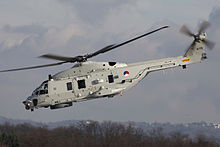
- 19 NH90, 11 NATO Frigate Helicopter (NFH) and eight transport version of the NATO Frigate Helicopter (TNFH) for Marine Corps Air Lift Helicopter Squadron.[34] One NFH was lost on 19 July 2020 as result of a crash in the Caribbean Sea near the island of Aruba, killing two of the four crew on board.
Since the retirement of the Westland Lynx, the Royal Netherlands Air Force fills the gap of the Lynx's amphibious task with Airbus AS-532U2 Cougar helicopters. The Cougar's main task is to support the Royal Netherlands Marine Corps on board of the LPD's and JSS. Other tasks are to provide Medical air transport to and from these ships, but also support SOF units in amphibious missions and trainings.
In 2012 an AH-64D Apache attack helicopter from the Royal Netherlands Air Force made a deck landing on board HNLMS Rotterdam for the first time as part of an initial study into the possibilities for wider use of the helicopters as these will be upgraded to the AH-64E standard which has specific features for maritime operations.
The Dutch amphibious support ship HNLMS Johan de Witt and the JSS HNLMS Karel Doorman are designed to handle Royal Netherlands Air Force CH-47F Chinook helicopters but still require additional anti corrosion measures (part of the ongoing upgrade of the CH-47F).
Drones
[edit]| Name | Origin | Type | Number | Photo | Notes |
|---|---|---|---|---|---|
| Airboxer[35] | VTOL UAV[36] | On 14 May 2024 it was reported that High Eye will deliver its Airboxer VTOL UAV to the Dutch navy.[37][38] | |||
| Seafox | UUV | [39] | |||
| REMUS | AUV | [40][41] |
Vehicles of the Royal Navy
[edit]| Name | Photo | Origin | Type | Number | Notes |
|---|---|---|---|---|---|
| Bronto F61 RPX
Scania P500 B10×4 6NA |

|
Firefighting truck | 1 | [42][43][44][45]
Equipped with Bronto RPX 61 superstructure to reach 61m height. | |
| DAF CF 410 FAN 560 6×2 | — | Swap body vehicle with crane for dutch marines firefighters | 3 | [46] | |
| Ford Transit | — | Utility vehicles | 1 | [46] |
Royal Netherlands Marine Corps equipment
[edit]Future changes
[edit]In April 2018, the Dutch Government approved a multi-year investment program and allocated funds for the 2018–2030 period, including:
- The Walrus-class submarines replacement with new boats planned for initial service entry in 2034.[26][27] The subs are currently undergoing a Service-life Extension Program (SLEP), including new sonar, new optronic periscope and weapon upgrades for near shore operations. The Royal Dutch Navy is evaluating Saab/Damen (A-26), TKMS (Upgraded 212), Navantia S-80 and a Naval Group (SSK version of Barracuda) proposal. In 2019 the S-80 option was dropped, originally with plans to place an order for the winning design in 2022 and having the first boat in service in 2028 and the first two by 2031.[47][28] However, in October 2021 it was reported that this timeline was no longer feasible. Instead, the Dutch Ministry of Defence signalled that the envisaged dates would have to be "substantially adjusted".[29] In April 2022 it was announced that the revised schedule for the construction of the new replacement boats would likely see the first two replacement vessels entering service in the 2034 to 2037 timeframe.[26] On 15 March 2024 State Secretary for Defence Christophe van der Maat officially announced that Naval Group has been selected as the winning bid.[48]
- Upgrading the De Zeven Provinciën-class LCF frigates Theatre Ballistic Missile Defense, acquisition of RIM-161 Standard Missile 3 (SM-3), a new OtoMelara 127/64 LW canon, ESSM-2 and SLCM BGM-109 Tomahawk and expanding the Mk41 VLS with an additional 8 cell unit.[49]
- Acquisition of initially two Multifunctional Support Ships to supplement existing LCF Frigates with extra container based AAW Barak-ER missiles and IAI Harop loitering munition in support of amphibious forces.
- Replacement of the Karel Doorman-class M frigates in the 2028/2030 period by 4 ships[50](plus another 2 for the Belgian Navy), designed & built by Damen Shipyards.[51] See Future Surface Combatant for more information.
- Replacement of the 6 Alkmaar-class MCM ships from 2025[30] including MCM Drones. 6 units each will be built for both the Belgian and Dutch navies for a total of 12 ships.[51] The contract was won by Naval Group on 15 March 2019 for the construction of 12 City-class mine countermeasures vessels.[52][53]
- Increasing the size of the Royal Netherlands Marine Corps to remain highly integrated with the British Royal Marines. In 2017 the Ministry of Defence announced the formation of a Fleet Marine Squadron for the protection of merchant ships.
- In June 2023, the British and Dutch governments announced that the two countries would "explore opportunities" to jointly develop new specialist amphibious warships which for the Royal Netherlands Navy would likely replace the Rotterdam-class landing platform docks.[54]
- The German Navy Seebatallion (Marines) will be integrated into the Royal Netherlands Marine Corps.
- Cooperation with the German Navy regarding Submarine & Amphibious Operations.
- Acquisition of a new Combat Support Ship to replace the former Zr.Ms. Amsterdam, designed & build by Damen Shipyards.[55] This ship will be based on the JSS Karel Doorman design to improve type commonality (architecture & components) and is expected to be delivered in 2024.[56] The ship will be named Zr.Ms. Den Helder after the city of Den Helder, with the pennant A834. First steel was cut in December 2020[57] and the ship was launched in October 2022.[58]
- Replacement of Zr.Ms. Mercuur, Zr.Ms. Pelikaan, the four diving support vessels, the diving training vessel Zr.Ms. Soemba, the hydographic vessels Zr.Ms. Snellius en Zr.Ms. Luymes and the training vessel Van Kinsbergen from 2024 onwards.
- Acquisition of new landing craft from 2025 with additional capacity to support amphibious operations and the integration of the German Navy Marines (Seebatallion). In March 2023, a report to the Dutch Parliament outlined a plan for 12 Littoral Assault Craft (LAC) and 8 Littoral Craft Mobility (LCM) to replace the 12 existing light landing craft (Landing Craft Vehicles and Personnel - LCVP) and improve on their capability.[59]
- Main Naval Ship Based Weapons will be replaced by acquiring ESSM-2, new 127mm canons, Harpoon ASuW replacement, SM-3, SM-2 IIIC SAM, Goalkeeper CIWS replacement, MK 46 & MK 48 Torpedo replacement and SLCM.
Theater ballistic missile defence
[edit]Together with the United States and several other NATO members, the Dutch Navy is testing and updating its ships for Tactical ballistic missile defense capability. Although tests conducted concerning the capability of the APAR (Active Phased Array Radar) have been very successful, in 2018 the Dutch Government approved plans to acquire the SM-3 missiles for integration into the existing weapon suite of the LCF frigates. The four LCF ships will be fitted out with eight SM-3 missiles each (they are provisioned for this VLS extension) through Foreign Military Sales (under discussion between the US and The Netherlands).
Historic ships
[edit]- Several ships by the name of HNLMS De Ruyter
- Several ships by the name of HNLMS Tromp
- Delft, 18th century fourth rate ship of the line
- De Zeven Provinciën, 17th century ship of the line and flagship of Michiel de Ruyter
- HNLMS Koning der Nederlanden, the navy's largest warship in the 19th century
- HNLMS Prins Hendrik der Nederlanden, ironclad from the 1860s
Surviving historic ships
Ranks and insignia
[edit]| NATO code | OF-10 | OF-9 | OF-8 | OF-7 | OF-6 | OF-5 | OF-4 | OF-3 | OF-2 | OF-1 | ||||||||||||||||||||
|---|---|---|---|---|---|---|---|---|---|---|---|---|---|---|---|---|---|---|---|---|---|---|---|---|---|---|---|---|---|---|

|

|

|

|

|

|

|

|

|

| |||||||||||||||||||||
| Luitenant-Admiraal | Vice-Admiraal | Schout-bij-Nacht | Commandeur | Kapitein ter zee | Kapitein-luitenant ter zee | Luitenant ter zee der 1ste klasse | Luitenant ter zee der 2de klasse oudste categorie | Luitenant ter zee der 2de klasse | Luitenant ter zee der 3de klasse | |||||||||||||||||||||
| Abbreviation (stnd) | LAdm | VAdm | SBN | Cdr | KTZ | KLTZ | LTZ1 | LTZ2OC | LTZ2 | LTZ3 | SgtADB | KplADB | ADB | |||||||||||||||||
| NATO code | OR-9 | OR-8 | OR-7 | OR-6 | OR-5 | OR-4 | OR-3 | OR-2 | OR-1 | |||||||||||||||||||||||||||
|---|---|---|---|---|---|---|---|---|---|---|---|---|---|---|---|---|---|---|---|---|---|---|---|---|---|---|---|---|---|---|---|---|---|---|---|---|
 |
No insignia | |||||||||||||||||||||||||||||||||||
| Adjudant-onderofficier/ Opperschipper |
Sergeant-majoor/ Schipper |
Sergeant/ Bootsman |
Korporaal/ Kwartiermeester |
Matroos der 1e klasse | Matroos der 2e klasse | Matroos der 3e klasse | ||||||||||||||||||||||||||||||
Royal Insignia
[edit]Insignia worn by the Monarch of the Netherlands when wearing the uniform of the Royal Netherlands Navy.

|
See also
[edit]- Government Navy
- Military history of the Netherlands
- Military ranks of the Dutch armed forces
- Netherlands Naval Aviation Service
- Royal Netherlands Navy Submarine Service
- Ships of the Royal Netherlands Navy
Notes
[edit]- ^ This is also the date accepted by Wragg.[62] Richard Ernest Dupuy and Trevor Nevitt Dupuy consider this as the founding date of the administrative foundations of the Dutch navy.[63] Sicking opines that the 1488 Ordinance marked a departure point from previous policies by establishing a centralized structure, although the objectives of the Ordinance initially could not be carried out because of strong opposition and unfavourable political climate (for example, the first central Admiral, Philip of Cleves, sided with the rebels against Maximilian since 1488). The situation improved with the appointment of Philip of Burgundy-Beveren in 1491, and especially since the tenures of Adolf and Maximilian of Burgundy. A true permanent central navy only emerged after the 1550-1555 period, under the governorship of Mary of Hungary, with Cornelis de Schepper also playing a major role.[64][65][66][67] Jaap R. Bruijn traces the origins of an independent Dutch navy to the early stages of the Eighty Years' War (1568–1648) while the formation of a "national" navy is dated to the establishment of the Dutch Republic in 1597.[68]
Citations
[edit]- ^ "Aantallen personeel". defensie.nl (in Dutch). 1 September 2023. Retrieved 16 August 2024.
- ^ Jopke Rozenberg-van Lisdonk (12 October 2022). "Wie zijn onze reservisten?". Alle Hens (in Dutch). Defensie.nl.
- ^ "The Royal Netherlands Navy in Focus". Government of the Netherlands. November 2015. Archived from the original on 2 September 2019. Retrieved 5 September 2019.
- ^ Defensie, Ministerie van (13 February 2014). "Organisation - Defensie.nl". english.defensie.nl. Retrieved 8 June 2023.
- ^ Defensie, Ministerie van (16 September 2019). "Geschiedenis marine - Koninklijke Marine - Defensie.nl". www.defensie.nl (in Dutch). Retrieved 8 June 2023.
- ^ "List of Acronyms Preceding the Name of a Ship". Corporation of Lower St. Lawrence Pilots. Archived from the original on 6 July 2011. Retrieved 31 July 2013.
- ^ "Defensieschepen worden meteen Zr. Ms. in plaats van Hr. Ms" (in Dutch). Volkskrant. 29 January 2013.
- ^ "Geschiedenis marine". defensie.nl. Archived from the original on 28 March 2016. Retrieved 25 May 2016.
- ^ Rodger, N. A. M. (2004) Command of the Ocean: A Naval History of Britain 1649–1815. Penguin Books, London; pp. 9–10
- ^ "World Battlefronts: Dutchman's Chance". Time. 23 February 1942. Archived from the original on 25 October 2011. Retrieved 3 June 2011.
- ^ Klemen, L (1999–2000). "The War at Sea". Forgotten Campaign: The Dutch East Indies Campaign, 1941–1942. Archived from the original on 5 March 2012. Retrieved 3 June 2011.
- ^ Dr. L. de Jong, Het Koninkrijk der Nederlanden in de Tweede Wereldoorlog (Dutch), 14 parts, part 11a-I-second half, RIOD, Amsterdam, 1975
- ^ "European Union Naval Force Operation ATALANTA". eunavfor.eu. Retrieved 12 January 2024.
- ^ "Missie in Somalië – Antipiraterij" [Mission in Somalia – Anti-piracy]. Defensie.nl (Ministry of Defence). Archived from the original on 9 January 2024. Retrieved 12 January 2024.
- ^ Oosthoek, Jack (14 May 2024). "'Wij blijven noodzakelijk'". Alle Hens (in Dutch). Koninklijke Marine.
- ^ Perreijn, Djenna (15 November 2020). "Reddingsboei voor uitgevallen militairen". Alle Hens (in Dutch). Koninklijke Marine.
- ^ Oosthoek, Jack (15 May 2023). "Sociaal Medische Dienst 75 jaar". Alle Hens (in Dutch). Koninklijke Marine.
- ^ "Organisatiestructuur marine". Defensie.nl (in Dutch). Koninklijke Marine.
- ^ "Nederlandse marine in het Caribisch gebied". Marineschepen.nl (in Dutch).
- ^ "Commandement der Zeemacht Caribisch gebied". Defensie.nl (in Dutch). Koninklijke Marine.
- ^ "Eerste nieuwe Kustwachtvliegtuig aangekomen - Nieuwsbericht - Defensie.nl". 10 September 2022.
- ^ @Nicole_Kuipers3 (28 October 2022). "De nieuwe SAR-helikopters van @kustwacht_nl zijn aangekomen op Den Helder Airport! Voordat ze operationeel worden,…" (Tweet) – via Twitter.
- ^ "Locaties Defensie". Defensie.nl (in Dutch). Ministerie van Defensie. Archived from the original on 7 April 2024. Retrieved 7 April 2024.
- ^ "Eenheden en locaties". Defensie.nl (in Dutch). Ministerie van Defensie. Archived from the original on 7 April 2024. Retrieved 7 April 2024.
- ^ "Koninklijk Instituut voor de Marine". defensie.nl. 13 February 2014. Archived from the original on 24 May 2016. Retrieved 25 May 2016.
- ^ a b "Dutch Navy Walrus-class submarine replacement project in progress". June 2021.
- ^ a b Gain, Nathan (8 November 2019). "Another short delay for the Dutch Navy Walrus-class submarine replacement program".
- ^ a b "Netherlands' Walrus-Class Submarine Replacement Program Facing Delays". 31 October 2021.
- ^ a b "First Steel Cutting Ceremony for Dutch-Belgian MCM program". 20 July 2021.
- ^ Robbie Warmerdam (14 February 2020). "Marine tekent contract voor civiel testschip voor mijnenbestrijding". Marineschepen.nl (in Dutch).
- ^ "MV Geosea onderdeel van de marinevloot". Stichting Regio omroep Noordkop (in Dutch). 5 March 2020.
- ^ Martin Manaranche (23 August 2021). "Royal Netherlands Navy Started Evaluation of its Future Mine Warfare Toolbox". Naval News.
- ^ "Royal Netherlands Navy Takes Delivery of a Mission Planning System for the NH90 NFH Fleet". 29 November 2013. Archived from the original on 3 December 2013. Retrieved 30 November 2013.
- ^ Peter Felstead (14 May 2024). "High Eye secures Airboxer VTOL UAV contract from Royal Netherlands Navy". European Security & Defence.
- ^ Abi Wylie (28 February 2024). "High Eye Wins an Open International Tender from the Netherlands". Unmanned Systems Technology.
- ^ "Royal Netherlands Navy selects High Eye's Airboxer VTOL Unmanned Aerial Vehicles". Army Recognition. 15 May 2024.
- ^ "Royal Netherlands Navy Selects High Eye's Airboxer VTOL UAV". Naval News. 28 May 2024.
- ^ Wouter Helders (7 October 2016). "Mijnenjagen voor gevorderden". Defensiekrant (in Dutch). Defensie.nl.
- ^ Arthur van Beveren (12 June 2020). "Waar staat Defensie en wat moet er nog gebeuren?". Defensiekrant (in Dutch). Defensie.nl.
- ^ "RNLN Integrates SeeByte's Neptune into its AUVs". marinetechnologynews.com. Marine Technology News. 28 September 2018. Archived from the original on 2 April 2019. Retrieved 2 April 2019.
- ^ Defensie, Ministerie van (3 August 2023). "Marinebrandweer paraat in Eemshaven vanwege uitgebrande Fremantle Highway - Nieuwsbericht - Defensie.nl". www.defensie.nl (in Dutch). Retrieved 1 December 2024.
- ^ Defensie, Ministerie van (9 August 2023). "Weekoverzicht Defensieoperaties - Nieuwsbericht - Defensie.nl". www.defensie.nl (in Dutch). Retrieved 1 December 2024.
- ^ "Marinebrandweer krijgt reusachtige hoogwerker - 03 - Defensiekrant". magazines.defensie.nl (in Dutch). Retrieved 1 December 2024.
- ^ Näsi, Aleksi (15 September 2021). "Bronto F61RPX for the Royal Dutch Navy | Bronto Skylift". Retrieved 1 December 2024.
- ^ a b "Brandweer Voertuigen Online, de meeste brandweervoertuigen op één site". www.brandweervoertuigenonline.nl. Retrieved 1 December 2024.
- ^ Kuper, Stephen (10 January 2020). "Dutch Navy confirms three corner fight for future sub program". www.defenceconnect.com.au.
- ^ "Bouw nieuwe onderzeeboten voorlopig gegund aan Naval" (in Dutch). Dutch Ministry of Defense. 15 March 2024. Retrieved 15 March 2024.
- ^ "Defensie zet in op meer maritieme slagkracht en inzetbaarheid - Nieuwsbericht - Defensie.nl". 17 May 2023.
- ^ "Dutch MoD clears path for the M-frigates replacement, expects delays". 24 June 2020.
- ^ a b Marine krijgt nieuwe schepen, Dutch Ministry of Defence, 3 May 2018, archived from the original on 3 May 2018, retrieved 3 May 2018
- ^ "France's Naval Group clinches Belgian-Dutch minehunter replacement contract". Naval Today. 15 March 2019. Archived from the original on 15 March 2019. Retrieved 15 March 2019.
- ^ Scott, Richard (15 March 2019). "Naval Group team selected for BE/NL MCM programme". Jane's 360. London. Archived from the original on 15 March 2019. Retrieved 15 March 2019.
- ^ "UK and Netherlands to explore opportunities around new ships for amphibious operations". Royal Navy. 30 June 2023. Retrieved 2 July 2023.
- ^ Karremann, Jaime. "Marine wil bevoorrader 'in de geest van Zr.Ms. Amsterdam'". marineschepen.nl. Archived from the original on 22 February 2018. Retrieved 22 February 2018.
- ^ Karremann, Jaime. "Nieuw bevoorradingsschip komt in 2022". marineschepen.nl. Archived from the original on 22 February 2018. Retrieved 22 February 2018.
- ^ "First steel cuts of Combat Support Ship CSS den Helder for Dutch Navy Netherlands".
- ^ "Damen "Launches" Royal Netherlands Navy's Combat Support Ship". Naval News. 25 October 2022. Retrieved 27 October 2022.
- ^ "Dutch marines to procure 20 new landing craft to replace LCVPs". Janes. 29 March 2023. Retrieved 30 March 2023.
- ^ a b "De rangonderscheidingstekens van de krijgsmacht" (PDF) (in Dutch). Ministry of Defence (Netherlands). 19 December 2016. Retrieved 18 March 2021.
- ^ Ministry of Defense (24 April 2013). "Besluit van 24 april 2013, houdende vaststelling van het Koninklijk Distinctief" [Decree of April 24, 2013, establishing the Royal Distinctive]. zoek.officielebekendmakingen.nl (in Dutch). Retrieved 2 February 2023.
- ^ Wragg, David (24 October 2012). The World Sea Power Guide. Pen and Sword. p. 243. ISBN 978-1-78303-558-8. Retrieved 12 January 2022.
- ^ Dupuy, Richard Ernest; Dupuy, Trevor Nevitt (1993). The Harper Encyclopedia of Military History: From 3500 BC to the Present. HarperCollins. p. 464. ISBN 978-0-06-270056-8. Retrieved 12 January 2022.
- ^ Sicking, L. H. J. (1 January 2004). Neptune and the Netherlands: State, Economy, and War at Sea in the Renaissance. BRILL. pp. 83, 129, 482–484. ISBN 978-90-04-13850-6. Retrieved 12 January 2022.
- ^ Bes, Lennart; Frankot, Edda; Brand, Hanno (2007). Baltic Connections: Archival Guide to the Maritime Relations of the Countries Around the Baltic Sea (Including the Netherlands) 1450-1800. BRILL. p. 1256. ISBN 978-90-04-16429-1. Retrieved 12 January 2022.
- ^ Bander, James (1 December 2014). Dutch Warships in the Age of Sail 1600-1714: Design, Construction, Careers & fates. Seaforth Publishing. p. 21. ISBN 978-1-84832-157-1. Retrieved 12 January 2022.
- ^ Heebøll-Holm, Thomas; Höhn, Philipp; Rohmann, Gregor (17 January 2019). Merchants, Pirates, and Smugglers: Criminalization, Economics, and the Transformation of the Maritime World (1200-1600). Campus Verlag. p. 120. ISBN 978-3-593-50979-2. Retrieved 12 January 2022.
- ^ Jaap R. Bruijn, "Dutch Navy" in Bruce, Anthony & Cogar, William (editors) An Encyclopedia of Naval History. Facts on File, New York. 1998; p. 121
References
[edit]- Klaauw, Bart van der (March–April 1999). "Unexpected Windfalls: Accidentally or Deliberately, More than 100 Aircraft 'arrived' in Dutch Territory During the Great War". Air Enthusiast (80): 54–59. ISSN 0143-5450.
- L, Klemen (2000). "Forgotten Campaign: The Dutch East Indies Campaign 1941–1942". Archived from the original on 26 July 2011. Retrieved 30 March 2021.
- "Geschiedenis marine". Official website. 16 September 2019. (in Dutch)


